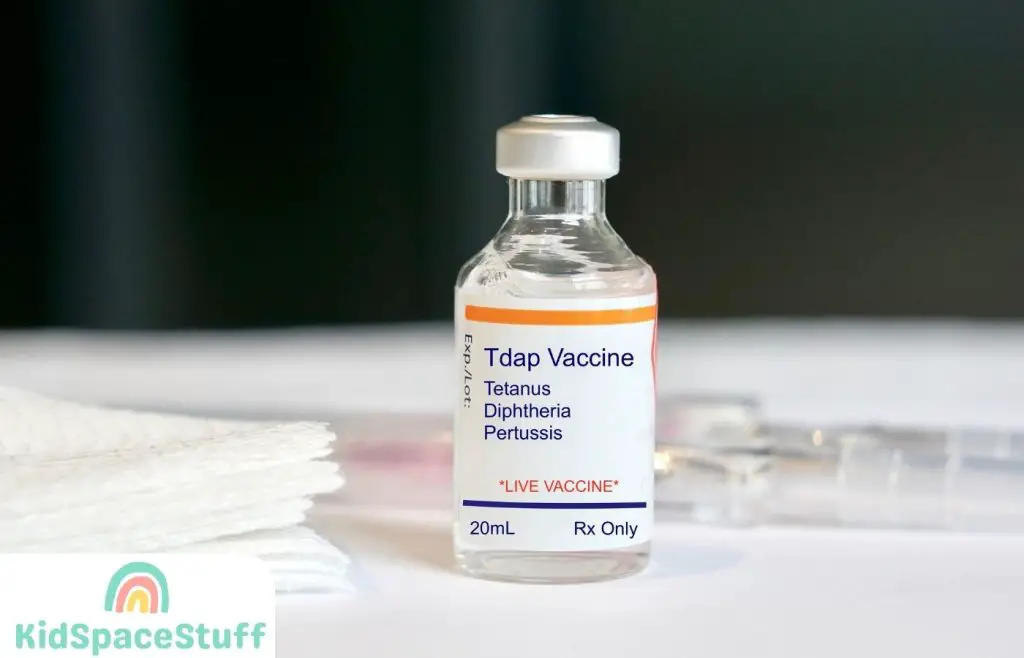The tiny pinprick of a vaccine needle is a small but crucial step in protecting children from life-threatening diseases, including tetanus. But when exactly should kids get their tetanus shot?
In this article, I’ll explore the recommended ages for tetanus vaccinations, the significance of booster shots, and the importance of adhering to the vaccination schedule. By the end, you’ll be well-informed about when it’s time for your child’s next tetanus jab. Let’s dig in!
Now, What Age Do Kids Get Tetanus Shot?
Starting at 2 months of age, all babies in the United States are vaccinated against tetanus.
The vaccination schedule continues with doses typically given at four months, six months, 15 to 18 months, and between 4-6 years old. This series of shots ensures optimal protection against tetanus for young children. Additionally, it’s recommended that children receive a booster Tdap shot around the age of 11 or 12 years.
Understanding Tetanus

Tetanus, often called “lockjaw,” is a severe bacterial infection caused by Clostridium tetani. This bacterium releases a toxin that affects the nervous system, leading to muscle stiffness and spasms.
The bacteria thrive in environments like soil, dust, and animal waste and can enter the body through open wounds or cuts.
Tetanus Vaccination for Kids
Tetanus is a dangerous illness caused by bacteria that can enter our bodies through cuts or wounds. It makes our muscles very stiff and can be harmful.
To protect kids from tetanus, there’s a vaccine called the DTaP. This vaccine does triple duty – it guards against tetanus, diphtheria (another illness), and pertussis (which is whooping cough).
Recommended Age for Tetanus Shots
Tetanus shots are given to kids at specific ages to protect them from tetanus disease. Here’s when they should get them:
Baby Stage
- First shot at two months old
- Second shot at four months old
- A third shot at six months old
Toddler Stage
- Fourth shot between 15-18 months old
Before Starting School
- Fifth shot between 4-6 years old
As they grow up
- They’ll get booster shots every ten years to keep the protection going.
In simple terms, kids start getting tetanus shots as babies and continue to get them as they grow to stay protected against the disease.
Common Concerns & Questions
Parents often have queries and concerns about vaccinations. Some common ones regarding the tetanus shot include:
- Side Effects: Most kids don’t have any problems, but some might experience pain, redness, or swelling at the injection site.
- Effectiveness: How long does the protection last? Typically, booster shots are needed every 10 years.
- Interactions: Is it safe to get with other vaccines? Yes, the DTaP can be given alongside other vaccinations.
Here’s a great video explaining where you get Tetanus.
What To Do If Your Kid Is Exposed To Tetanus?
Tetanus is a potentially dangerous disease caused by a toxin-producing bacterium that can enter the body through wounds. Here’s a simple guide on what to do if your child is exposed to tetanus:
#1: Evaluate the Wound
Check the wound. The risk might be higher if it’s a deep or dirty wound or caused by a rusted or contaminated object.
#2: Clean the Wound
Clean the wound thoroughly with soap and water. This can help remove bacteria and debris.
#3: Seek Medical Attention
Always consult a doctor or healthcare professional when you think your child has a wound that could be at risk for tetanus, even if the damage seems minor.
#4: Check Vaccination Records
Know your child’s vaccination history. If your child is up-to-date with their tetanus shots, they might need a booster. If not, they might require a tetanus immunoglobulin shot for immediate protection.
#5: Follow Medical Advice
Depending on the wound and your child’s vaccination status, the doctor might recommend a tetanus booster shot or other treatments.
#6: Monitor for Symptoms
Symptoms of tetanus include muscle stiffness, spasms, difficulty swallowing, and fever. If you notice any of these symptoms in your child after a wound, seek medical help immediately.
#7: Prevent Future Exposures
Ensure your child receives regular tetanus boosters as health guidelines recommend. Also, always encourage safe play and use protective gear to minimize injuries.
Final Thoughts
To conclude, kids typically receive the tetanus shot, also known as the DTaP vaccine, at various stages, as early as 2 months old.
Ensuring your child receives their tetanus shot at the recommended age is crucial in safeguarding them against this dangerous disease. Like all health decisions, being well-informed and staying up-to-date with vaccinations ensures your child’s safety but also the well-being of the community. Remember, vaccinations are a shield against potential threats, and the tetanus shot is no exception. Thanks for reading!
KidSpaceStuff is a site dedicated to helping parents find the best interior design, activities, and inspiration for their kids.